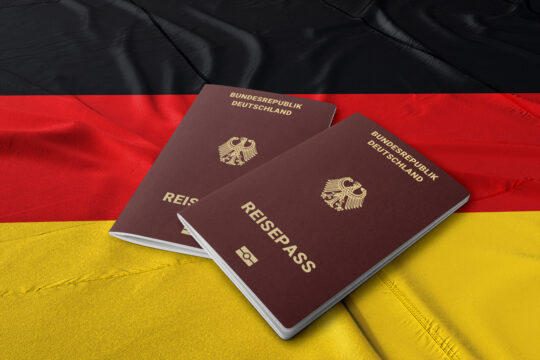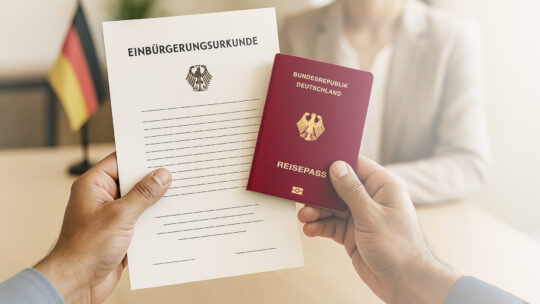The significance of Section 20 AufenthG
Section 20 of the Residence Act is part of the Act on the Residence, Gainful Employment and Integration of Foreigners in the Federal Territory and is used for job searches following stays in the Federal Territory
§ Section 20 of the Residence Act is issued as a residence permit to enable skilled workers from abroad to gain access to the German labor market during their stay in Germany. For many international skilled workers, this paragraph provides an important basis for gaining a foothold in Germany after their qualification and building up career prospects.
Legal basis of § 20 AufenthG
Section 20 of the Residence Act ( AufenthG ) stipulates that skilled workers can obtain a residence permit to look for a job after successfully completing certain training and further education courses in Germany.
This applies in particular:
- Following successful completion of a course of study in Germany (as part of a residence permit under § 16b or § 16c AufenthG).
Following successful completion of qualified vocational training in Germany(16a AufenthG). - Subsequently, after completion of the research activity in the federal territory as part of a stay in accordance with § 18d or § 18f AufenthG.
- If you meet the requirements for the granting of § 16d AufenthG for the recognition of foreign qualifications
- Following successful completion of assistant or helper training in the health and care sector (if the activity may be carried out by foreigners in accordance with the provisions of §§ 18a, 18b, 18d, 18g, 19c and 21).
The residence permit enables the person concerned to look for suitable employment for a period of up to 18 months. Securing a livelihood is a prerequisite for this. In the case of training as an assistant in the health and care sector, the period includes twelve months.
Overview of the new regulation of Section 20 AufenthG from 2024
The changes introduced from March 2024 in the context of residence in accordance with Section 20 AufenthG include an expansion of the scope of application. What is new is the possibility that skilled workers who have successfully completed an assistant training course in the healthcare and nursing sector in Germany can also obtain a residence permit to look for a job.
This is a significant change, as previously the focus was primarily on academic professions. The new regulation is intended to actively combat the shortage of skilled workers in the healthcare sector and make it easier for qualified international workers to enter the German labor market.
To which skilled workers does § 20 AufenthG apply?
§ Section 20 AufenthG is issued to a large number of foreigners who have successfully completed training in various professions. These include
- Academic professions such as engineers, scientists and IT specialists
- Professionally qualified persons in technical and manual occupations
- Healthcare professionals, especially with assistant or helper training
Regardless of the exact qualification, as a skilled worker you must prove that your training is a state-recognized or comparably regulated training occupation in Germany, which is open to foreign skilled workers in Germany in terms of determining equivalence.

Requirements and application for § 20 AufenthG
Applying for a residence permit to seek gainful employment in accordance with Section 20 AufenthG requires precise preparation. If you would like to come to Germany as an international skilled worker, it is important that you know all the necessary requirements and correctly implement the necessary steps in the application process.
Documents required for the application
Certain documents must be submitted for your application under Section 20 AufenthG to be successful:
- Valid passport - Your passport should be valid for the entire duration of your planned stay.
- Proof of your qualifications - This usually includes a certificate of your degree, vocational training or healthcare assistant training.
- Recognition of qualification in Germany - If your qualification was not obtained in Germany, you will need official recognition.
- Proof of rental agreement: Complete proof of the rental agreement and your accommodation.
- Proof of livelihood - you must prove that you are financially secure. This can be salary slips, bank statements or an employment contract.
- Proof of health insurance - Proof of valid health insurance is mandatory.
Application process step by step
We have clearly summarized the steps for you so that you do not overlook anything when submitting your application:
- Make an appointment at Foreigners' office
Contact the responsible Foreigners' office in good time to arrange an appointment for the application. - Preparation of the required documents
Make sure that all documents are complete and in the correct form. If certain documents are missing, this can lead to considerable delays. - Submitting applications on site or online
In some federal states, it is already possible to submit applications digitally. Find out in advance which options are offered by your competent authority. - Review by the authorities
Once the application has been submitted, it will be reviewed by Foreigners' office. This may take several weeks. Be ready to respond quickly in the event of queries or additional requirements. - Receiving your residence permit
As soon as your application has been approved, you will receive your residence permit in the form of an electronic residence permit card (eAT). With this card, you are officially authorized to look for a job in Germany.
Securing your livelihood - what you need to look out for
Securing your livelihood is one of the key requirements for obtaining a residence permit in accordance with § 20 AufenthG. You must prove that your livelihood is secured for the entire duration of the residence permit.
These include:
- Rent and ancillary costs
- Health insurance and other insurances
- Living costs such as food, transportation and personal expenses
Particularly important: If you receive financial support from relatives during your job search, this evidence must also be fully and comprehensibly documented. This is the only way to ensure that your application is approved.
Job search and extension of § 20 AufenthG
Once you have received your residence permit in accordance with § 20 AufenthG, the real challenge begins: successfully finding a job. This residence permit offers you the opportunity to find a job in Germany for a limited period of time and thus lay the foundation for your long-term stay.
How long is the residence permit valid for?
The residence permit according to § 20 AufenthG is issued for a period of up to 18 months.
You can use this time to:
- to take up qualified employment in the professional field they have learned,
- to acquire further qualifications or recognitions, if still necessary,
- and orient themselves on the German labor market.
Important: It is advisable to look for suitable job offers as early as possible so that you have enough time to write applications and attend job interviews. If you are accepted for a permanent position within the first few months, it is possible to adjust your residence status immediately and stay in Germany long-term.
Job opportunities in the health and care sector
Job opportunities in the health and care sector are particularly promising. The Skilled Immigration Act has created many new opportunities to facilitate entry into this sector.
There are numerous advantages for applicants with the relevant training:
- High demand for qualified specialists: Hospitals, nursing homes and outpatient care services are urgently looking for staff.
- Rapid recognition of foreign qualifications: Especially in the healthcare sector, qualifications from abroad are often given priority.
- Additional funding programs and support: Many cities and municipalities offer special integration programs for skilled workers in this area.
- Attractive salary prospects and promotion opportunities: There are well-paid positions for trained nursing staff, especially in conurbations and large cities.
Use these opportunities to position yourself in the best possible way. It is also advisable to make targeted contacts and network at career fairs or specialist events.
Working with § 20 AufenthG
You can also go to work with an eAT (electronic Residence permit) and possession of § 20 AufenthG. This also allows you to secure your livelihood while you are looking for permanent employment, which you can then use to change your Residence permit .
Possible Residence permit according to § 20 AufenthG
The residence permit according to § 20 AufenthG offers you the opportunity to look for a job and integrate in Germany in the long term. But what happens when you find a job? What other Residence permit options are then open to you? Depending on your professional and personal situation, various options may be relevant.
Variants of § 18 AufenthG
The legal provisions in German residence law are varied and sometimes somewhat complex. To help you keep an overview, here is a brief explanation of the most important differences between the paragraphs that could be relevant to you after you have found a job:
§ Section 18a AufenthG - skilled workers with vocational training
This Residence permit is specifically intended for skilled workers with recognized vocational training. If you find a job that matches your qualifications, you can have your Residence permit changed from § 20 AufenthG to § 18a AufenthG.
Prerequisites:
Recognized professional qualification or German vocational training
Proof of an employment contract
Secure livelihood
Other possible Residence permit
In addition to Section 18a AufenthG, there are other options that could be open to you after you have successfully found a job:
§ Section 18b AufenthG Section 18b AufenthG is suitable for people who have previously completed a course of study and wish to pursue qualified employment.
§ Section 18d AufenthG - Residence permit for researchers and scientists
If you would like to work in research after finding a job or training, this Residence permit is relevant. It offers you the opportunity to participate in research projects.§ Section 18g AufenthG - Blue Card
Particularly interesting for highly qualified skilled workers. The Blue Card offers attractive conditions if you have a job offer with an annual salary above the specified threshold.§ Section 19c Residence Act - Residence rights for special groups
This section is very diverse and covers special regulations for certain groups of people, such as graduates, managers or special professional groups.
§ Section 21 AufenthG as an alternative
If you would like to become self-employed after finding a job or training in Germany, you may be interested in Residence permit in accordance with § 21 AufenthG. This title is aimed at skilled workers who would like to contribute to the German economy through self-employment.
Examples of such situations:
Founding a start-up
Takeover of an existing company
Freelance work (e.g. as a doctor, lawyer or architect)
If you decide to become self-employed after successfully finding a job, you must consider the following points:
Viability check: Foreigners' office checks whether your business model is realistic and feasible.
Financial security: Sufficient equity capital must be available or written confirmation of financing by a third party.
Economic impact: Your company should have a positive impact on the local or national economy.
Tip: Prepare your business plan carefully and, if possible, get support from the Chamber of Industry and Commerce (IHK), chambers of skilled trades, business consultants or networks that specialize in start-ups by foreign skilled workers.
Go to Settlement permit or Naturalization
A successful entry into the German labor market opens up long-term prospects, including the option of a Settlement permit or even the Naturalization. Although the path to this goal is challenging, it is achievable with the right preparation:
Settlement permit:
You can obtain this title in accordance with § 18c AufenthG if you have worked in Germany for at least 2 years with an employment contract, have been legally resident in Germany for at least 5 years, have improved your language skills (at least B1 level) and meet the general requirements (e.g. secure livelihood, no criminal record).Naturalization:
After 5 years of legal residence in Germany, the new Naturalization Act gives you the opportunity to apply for German citizenship under certain conditions. With a C1 language certificate and special integration achievements, Naturalization is also possible after 3 years.
Important factors here include
- Clarification of identity
- Proof of livelihood security
- Proof of a B1 language certificate in German or better
- Signed declaration of loyalty and commitment to the free democratic basic order
- Successfully passed naturalization test
Typical errors with § 20 AufenthG
When applying for a residence permit in accordance with Section 20 AufenthG, there are a number of pitfalls that can lead to delays, additional costs or even a rejection of the application. So that you can concentrate on your career planning, it is important to avoid typical mistakes right from the start.
Incorrect documents and evidence
A common mistake when applying for a residence permit under Section 20 AufenthG is incomplete or incorrect documents. This can not only lead to delays but, in the worst case, to your application being rejected. You should therefore pay particular attention to the following points:
- Notarized translations: All foreign documents (e.g. certificates, birth certificates) must be notarized and translated into German.
- Correct proof of the degree or training qualification: It is not enough to submit just the diploma. Make sure that you also submit all relevant diplomas and certificates in the required form.
- Missing proof of professional qualifications: Proof of qualified professional training must be provided in accordance with the requirements of the recognition procedures in Germany. Avoid submitting only copies - certified copies or originals are mandatory.
Tip: Prepare your documents in good time and, if necessary, seek support from a specialist consultancy. This will save you unnecessary waiting times and additional demands from the authorities.
Difficulties in securing a livelihood
Another common stumbling block is providing proof of livelihood. This point is examined very closely by the authorities, as securing a livelihood is one of the main requirements for obtaining a residence permit.
The most common errors in this area:
- Insufficient monthly income: Your income must be sufficient to cover your living expenses. Make sure that all relevant sources of income (salary, financial support from third parties, etc.) are taken into account.
- Insufficient health insurance: A valid health insurance policy is mandatory in Germany and must be fully documented. This must also be in place while seeking unemployment.
- Lack of proof of savings or financial reserves: Especially if you currently have no fixed income, it is important that you have financial reserves and can prove this with bank statements.
Tip: If necessary, take the opportunity to have your income situation checked by a lawyer in advance. This will help you avoid potential difficulties and ensure that your applications are submitted correctly and in full.
Incomplete applications and their consequences
An incomplete application can quickly lead to long waiting times or even be completely rejected. It often depends on small details that can easily be overlooked in the abundance of documents to be submitted. Pay particular attention to:
- Missing attachments: Before submitting the application, check whether you have enclosed all the necessary forms and attachments (e.g. copy of passport, application form, proof of insurance).
- Signature and contact details: Check that all documents are correctly signed and that your current contact details are provided.
- Proof of the purpose of residence: Proof of the purpose of residence (e.g. job search in the healthcare sector, job offer) is particularly important. A missing document in this area often leads to an immediate rejection.
Tip: Use a checklist for your application and go through all the necessary documents point by point. This will help you avoid typical mistakes and increase the chances of your application being approved the first time.
Legal consequences of rejections and how to avoid them
If your application is rejected due to missing or incorrect documents, you often have to wait for a blocking period or can only submit a new application once the correct documents have been submitted. This not only leads to delays, but also to unnecessary stress and additional costs.
- Rejection of the application: The authority will inform you in writing and give you the reasons for the rejection. In many cases, an appeal is possible.
- Blocking periods: If the application is rejected for serious reasons (e.g. false information, attempts to deceive), a blocking period may be imposed during which you may not submit a new application.
- Loss of residence permit: Repeated violations may result in the loss of your residence permit, especially if false information is provided regarding your means of subsistence.
Conclusion on the Residence permit job search
The Residence permit in accordance with § 20 AufenthG offers you a valuable opportunity to further expand your career opportunities after completing qualified training or studies in Germany. Here we have listed the most important points for you once again and drawn a conclusion on the topic.
The most important key points of Section 20 AufenthG
- 18 months to look for a job: After successfully completing an apprenticeship or course of study, you will receive a residence permit to look for a suitable job.
- Securing your livelihood is crucial: Make sure you submit the required evidence completely and correctly to speed up the application process.
Conclusion and future of Section 20 AufenthG
The Residence permit according to § 20 AufenthG will continue to play an important role for skilled workers who want to work in Germany in the long term. With the right preparation and professional support, you can optimize your professional career in Germany.
FAQ - The most frequently asked questions about § 20 AufenthG
§ Section 20 AufenthG allows skilled workers to obtain a residence permit to look for a job after completing qualified training or studies in Germany.
You need to have successfully completed an apprenticeship or course of study in Germany and be able to earn a living.
The residence permit according to § 20 AufenthG is valid for a maximum of 18 months.
Yes, gainful employment is permitted and therefore you can also secure your livelihood
§ Section 18a AufenthG applies to skilled workers with vocational training who wish to take up qualified employment in Germany.









